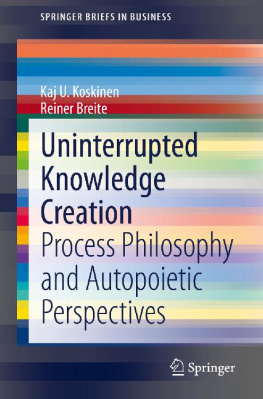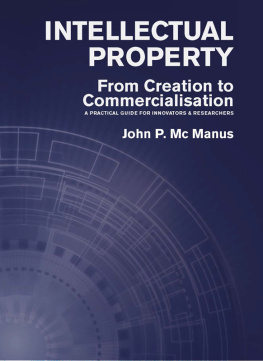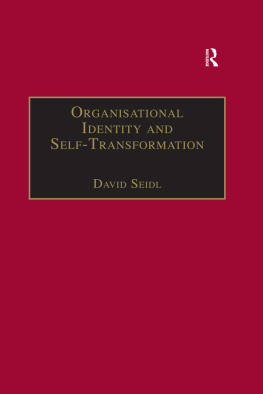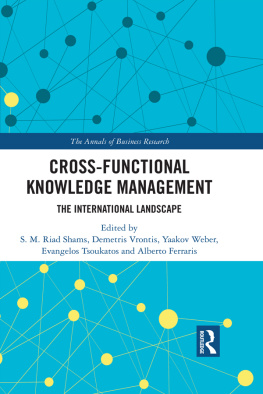SpringerBriefs in Business
SpringerBriefs present concise summaries of cutting-edge research and practical applications across a wide spectrum of fields. Featuring compact volumes of 50 to 125 pages, the series covers a range of content from professional to academic. Typical topics might include:
A timely report of state-of-the art analytical techniques
A bridge between new research results, as published in journal articles, and a contextual literature review
A snapshot of a hot or emerging topic
An in-depth case study or clinical example
A presentation of core concepts that students must understand in order to make independent contributions
SpringerBriefs in Business showcase emerging theory, empirical research, and practical application in management, finance, entrepreneurship, marketing, operations research, and related fields, from a global author community.
SpringerBriefs in Business showcase emerging theory, empirical research, and practical application in management, finance, entrepreneurship, marketing, operations research, and related fields, from a global author community.
More information about this series at http://www.springer.com/series/8860 Briefs are characterized by fast, global electronic dissemination, standard publishing contracts, standardized manuscript preparation and formatting guidelines, and expedited production schedules.
Kaj U. Koskinen and Rainer Breite
Uninterrupted Knowledge Creation
Process Philosophy and Autopoietic Perspectives
1st ed. 2020
Kaj U. Koskinen
Tampere University, Tampere, Finland
Rainer Breite
Tampere University, Tampere, Finland
ISSN 2191-5482 e-ISSN 2191-5490
SpringerBriefs in Business
ISBN 978-3-030-57302-7 e-ISBN 978-3-030-57303-4
https://doi.org/10.1007/978-3-030-57303-4
The Editor(s) (if applicable) and The Author(s), under exclusive license to Springer Nature Switzerland AG 2020
This work is subject to copyright. All rights are solely and exclusively licensed by the Publisher, whether the whole or part of the material is concerned, specifically the rights of translation, reprinting, reuse of illustrations, recitation, broadcasting, reproduction on microfilms or in any other physical way, and transmission or information storage and retrieval, electronic adaptation, computer software, or by similar or dissimilar methodology now known or hereafter developed.
The use of general descriptive names, registered names, trademarks, service marks, etc. in this publication does not imply, even in the absence of a specific statement, that such names are exempt from the relevant protective laws and regulations and therefore free for general use.
The publisher, the authors and the editors are safe to assume that the advice and information in this book are believed to be true and accurate at the date of publication. Neither the publisher nor the authors or the editors give a warranty, expressed or implied, with respect to the material contained herein or for any errors or omissions that may have been made. The publisher remains neutral with regard to jurisdictional claims in published maps and institutional affiliations.
This Springer imprint is published by the registered company Springer Nature Switzerland AG.
The registered company address is: Gewerbestrasse 11, 6330 Cham, Switzerland
I dedicate this book to my god-daughter, Marie.
In Memory of Kaj Koskinen
Kaj retired from his post in university in 2010. Despite retiring he continued his research which was his greatest interest. When his other work at the university was left behind he was able to focus on writing. During his early years of retirement, Kaj wrote the book Knowledge Production in Organizations (Springer 2013), which was the third of his scientific books.
While teaching, it was characteristic of Kaj to expect his students to delve thoroughly into the subject. Sometimes, at home, he might voice aloud his annoyance at students not giving as much as he was expecting. But above all, Kaj was demanding of himself. In his writing and research, he was uncompromising. The will to understand things deeply followed him throughout his life. Coming from a modest background and respecting his fathers wishes, he first studied in a vocational school and worked as a business machine technician for 10 years. With time, he was able to study further to become an engineer and later to graduate as a Master of Science. Finally in 2001, he graduated as a Doctor of Technology. According to Kaj, the last third of his working career, years 19962010 working in the university setting, was the happiest years of his life. Kaj had found a great passion that kept him interested for the rest of his life, and the creative process then continued after his retirement, literally until his death.
The writing of this book took two and half years. During his last years, Kaj studied philosophy at the University of Turku to get a deeper understanding of his research subject from a philosophical perspective. In this book, he wanted to extend his previous work while creating a new perspective or a way of thinking.
After being diagnosed with cancer, Kaj became worried that he might not be able to finish this book. Still, he was determined to try. Kaj continued writing unflaggingly despite increasing fatigue. The last summer of his life, he told his spouse that the only thing that managed to bring him joy anymore was writing and the thinking involved in that. He realized that there might not be a lot of time left for completing his work and accordingly got up every day to make even little progress in the writing process. Towards the end, Kaj needed help with technicalities, and he was grateful that his two adult children could help with them.
As a spouse, I came to understand that Kaj wanted to write his last book not only for the scientific community but also for his closest circle, his family, relatives, and friends. This last book Kaj dedicated to his god-daughter, Marie. I know that Kaj thought that science and independent, creative thinking were everlasting. This book is a tangible expression of that ideal and of the unconditional search for knowledge that he wanted to leave as a legacy for all he loved.
Kajs studies identify the productive and interesting theoretical junction of the research paths, where process philosophy, the concept of knowledge, and the autopoietic point of the view meet. Together they form a fascinating research platform for those researchers who want to increase understanding of the role of the philosophical aspect of knowledge creating and sharing processes. Kajs research findings shed light especially on autopoietic systems and their importance, when we are trying to increase understanding about the processes and systems of knowledge sharing and creating.
As Kaj has written: Past, present and future are all right here in the present moment. The present moment is the only place where they really exist, for it is only individual awareness that places something as past, present or future. In contrast to clock time, individuals actual experience of human time is naturally more organic than linear. Although we can examine time in different ways, we can agree that the meaning of Kajs thoughts and research results endure in time, and they will utilize the study of knowledge now and in the future.
Pivi Kianne
Acknowledgements







